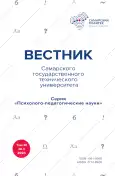Подготовка будущих учителей к организации педагогического просвещения родителей на основе реализации психолого-педагогических механизмов
- Авторы: Пахомова М.А.1
-
Учреждения:
- Оренбургский государственный педагогический университет
- Выпуск: Том 20, № 3 (2023)
- Страницы: 5-16
- Раздел: Теория и методология образования
- URL: https://journal-vniispk.ru/1991-8569/article/view/253317
- DOI: https://doi.org/10.17673/vsgtu-pps.2023.3.1
- ID: 253317
Цитировать
Полный текст
Аннотация
Рассматривается эффективность применения психолого-педагогических механизмов для подготовки будущих учителей к организации педагогического просвещения родителей. Работа педагогов школ по просвещению родителей в вопросах обучения, воспитания и развития детей всегда остается актуальной и требующей особого внимания, поскольку современные родители часто испытывают проблемы, связанные с организацией семейного воспитания. Применение в работе с будущими педагогами таких механизмов, как стимулирование эмоционального переживания, насыщения и педагогическая поддержка мотивации, является в данном случае наиболее эффективным и легко реализуемым в формате учебного тренинга. Тренинг выступает методом активного обучения, целью которого является развитие знаний, умений, навыков и различных социальных установок. После анализа разных источников и результатов проведенного исследования по проблеме реализации психолого-педагогических механизмов стимулирования эмоционального переживания и мотивации будущих учителей к взаимодействию с родителями нами был разработан тренинг «Позитивное взаимодействие и мотивация». Применение предложенных нами материалов при организации образовательной деятельности в педагогическом вузе позволяет решить проблему подготовки будущих учителей к организации педагогического просвещения родителей, а также создать позитивный эмоциональный настрой и повысить уровень мотивации студентов к данному виду деятельности.
Полный текст
Открыть статью на сайте журналаОб авторах
Мария Александровна Пахомова
Оренбургский государственный педагогический университет
Автор, ответственный за переписку.
Email: masha_pashinina@mail.ru
ORCID iD: 0000-0002-3132-0299
SPIN-код: 3846-1965
аспирант кафедры Педагогики и социологии
Россия, 460014, Оренбург, ул. Советская, 19Список литературы
- Аминов Н.А., Малахова В.Р., Чернявская В.С. Механизм самораскрытия способностей у подростков как фактор академической успешности // Сибирский психологический журнал. – 2021. – № 82. – С. 96–119.
- Аминов Н.А., Чернявская В.С., Осадчева И.И. Дифференциальный контекст исследования педагогических способностей и педагогического мастерства // Мир психологии. – 2020. – № 3 (103). – С. 131–143.
- Мазилов В.А., Костригин А.А. Проблема педагогических способностей в современной зарубежной психологии // Психология и психотехника. – 2021. – № 2. – С. 68–85.
- Митина Л.М. Личностно-профессиональное развитие учителя: стратегии, ресурсы, риски. – М., СПб: Нестор-История, 2019. – 456 с.
- Сластенин В.А., Асадуллин Р.М. Формирование личности учителя как субъекта педагогической деятельности // Сибирский педагогический журнал. – 2010. – № 5. – С. 224–228.
- Гуслякова Н.И. Эмоциональный интеллект как движущая сила обучения в высшей школе // Тьюторское сопровождение в системе общего, дополнительного и профессионального образования: III Всероссийская научно-практическая конференция с международным участием. – Челябинск: Край Ра, 2021. – С. 153–159.
- Кравцов Л.Г. Психологические особенности профессионального педагогического сознания и его возможные дефициты // Организационная психолингвистика. – 2022. – № 3 (19). – С. 10–31.
- Леонтьев А.Н., Леонтьев А.А., Леонтьев Д.А., Соколова Е.Е. Деятельность, сознание, личность. – М.: Смысл, 2015. – 431 с.
- Мухина В.С. Личность: Мифы и реальность (Альтернативный взгляд. Системный подход. Инновационные аспекты): 5-е изд., испр. и доп. – М.: Национальный книжный центр, 2020. – 1088 с.
- Рубинштейн С.Л. Проблемы общей психологии. – М.: Педагогика, 1993. – 416 с.
- Савченков А.В. Эмоциональный компонент готовности будущих педагогов к воспитательной деятельности // Нижегородское образование. – 2021. – № 1. – С. 134–140.
- Симонов П.В. Эмоциональный мозг. – СПб: Питер, 2021. – 288 с.
- Шингаев С.М., Симагина И.К., Юркова Е.В. Эмоциональная компетентность педагога – фактор успешной профессиональной деятельности: взгляд с позиций В.А. Сухомлинского // В.А. Сухомлинский: Современное прочтение: Сборник статей научно-практической конференции с международным участием. – СПб: Ленинградский областной институт развития образования, 2020. – С. 119–124.
- Бакунович М.Ф., Полещук Ю.А. Динамика мотивации достижения студентов в процессе обучения // Феномен человека. Философско-психолого-педагогические аспекты формирования и развития личности современного человека: сборник трудов Международной научно-практической конференции. – Подольск: Московский областной гуманитарный институт, 2020. – С. 24–27.
- Усова Н.А. Проблема формирования мотивационно-ценностного отношения будущих педагогов к профессиональной деятельности // Образование и проблемы развития общества. – 2019. – № 1 (7). – С. 68–73.
- Шалаев И.К. Инновационный потенциал мотивационного программно-целевого управления образованием как предмет диссертационных исследований и передового опыта // Мир науки, культуры, образования. – 2020. – № 2 (33). – С. 223–226.
- Якобсон П.М. Психология чувств и мотивации. – Воронеж: МОДЭК, 2008. – 304 с.
- Сластенин В.А., Исаев И.Ф., Шиянов Е.Н. Педагогика. – М.: Академия, 2008. – 566 с.
- Зимняя И.А. Педагогическая психология. – М., 2022. – 480 с.
- Кузьмина Н.В., Реан А.А. Профессионализм педагогической деятельности. – СПб.; Рыбинск: Б. и. Н.-и. центр развития творчества молодежи, 2003. – 54 с.
- Mac Cann C., Jiang Y., Brown L.E.R., Double K.S., Bucich M., Minbashian A. Emotional intelligence predicts academic performance: A meta-analysis. Psychological Bulletin. 2020. Vol. 146 (2). Рр. 150–186.
- Mansfield C., Wosnitza M., Beltman S. Goals for teaching: Towards a framework for examining motivation of graduating teachers. Australian Journal of Educational & Developmental Psychology. 2018. Vol. 12. Рр. 21–34.
- Simić N., Purić D., Stančić M. Motivation for the teaching profession: Assessing psychometric properties and factorial validity of the Orientation for Teaching Survey on in-service teachers. Psihologija. 2019. Vol. 51(3). Рр. 309–331.
Дополнительные файлы







